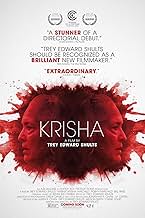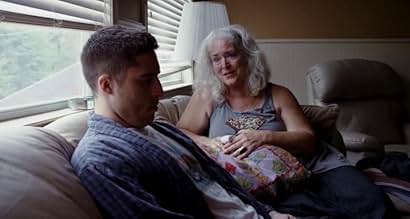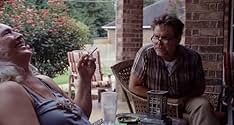CALIFICACIÓN DE IMDb
7.1/10
11 k
TU CALIFICACIÓN
Krisha regresa para la cena de Acción de Gracias después de diez años lejos de su familia, pero los demonios de su pasado amenazan con arruinar las fiestas.Krisha regresa para la cena de Acción de Gracias después de diez años lejos de su familia, pero los demonios de su pasado amenazan con arruinar las fiestas.Krisha regresa para la cena de Acción de Gracias después de diez años lejos de su familia, pero los demonios de su pasado amenazan con arruinar las fiestas.
- Dirección
- Guionista
- Elenco
- Premios
- 17 premios ganados y 28 nominaciones en total
- Dirección
- Guionista
- Todo el elenco y el equipo
- Producción, taquilla y más en IMDbPro
Opiniones destacadas
I don't know where that "comedy" label on IMDb comes from. I don't think it functions even as a black comedy. Absolutely heavy and quite dark, but fabulously written, directed, and acted. There are many films that deal with this sort of premise (even Rachel Getting Married comes to mind) but this really took it to another level. Completely immersive, watching it all unravel just hurts to watch. Not an easy viewing by any means and definitely one that will divide audiences completely (even on this board, I can see many people hating it). I loved it though, easily one of the best of the year so far. Krisha Fairchild should absolutely be in contention for end-of-the- year awards, and Trey Edward Shults shows a lot of talent.
This movie is a depressing, well-shot trip full of heart-pounding music. The shots are long and flowing, depicting the downward mental spiral of a crazy old woman. I'd call this a thriller. Its worth watching just to experience the mild insanity of this thanksgiving gathering. Mundane scenes in this short slice-of-life story are intensified by an incredible soundtrack. This movie doesn't have much in the way of a plot or script, and is heavily reliant on stunning visuals. This story is a sad one and not for everyone, but if you're interested, then this is worth a watch.
For reasons never made entirely evident, 60-something Krisha has willfully severed ties for several years with her family, including a now young adult son. She decides to reconnect with her kin for Thanksgiving dinner at the suburban home of her sister and her family.
I grew up in a suburban Texas community not unlike the one which serves as the setting for the entirety of "Krisha". As such, I can almost literally sense the air, smell the scents and feel the sensibility of the space these characters inhabit. I have lived it. The memories for me are lasting. And they are abundantly good. Not so in this mostly morose and melancholy scenario.
Veteran but still little-known actress Krisha Fairchild ("The Killing of John Lennon" representing one of a handful of somewhat recognizable credits) delivers remarkable and wrenching work here. Fairchild is exceptionally effecting as she gives us a deeply troubled profile of an irrevocably tortured soul riddled with substance abuse, self loathing, uncontrollable anger and crippling regret.
This is a mysterious woman to be sure. Where exactly has Krisha been for all of these years in estrangement? What is it that has occupied her life during this time of indistinct purpose? Krisha reveals only vague hints and innuendo to various members of an uncomfortably skeptical family. Observing the holiday festivities and camaraderie carry on all about her, she remains remote, detached, never engaging in any of it, focusing instead almost exclusively and at her own insistence on preparing the super-sized turkey for that evening's meal.
The very characteristics that make Fairchild's portrayal so riveting are the same traits that make this excruciatingly conflicted character so dreadfully off-putting. Because we do not come to know practically anything at all about why Krisha ever abandoned her family in the first place, we never have a frame of reference for why she would ever even choose to do this. This confounding ambiguity leaves us feeling as distant from Krisha as she is from her own flesh and blood relatives. How can we genuinely invest in and grow to care for a person about whom we know virtually nothing and who has given us no compelling reason to do so? We feel very sorry for Krisha, sure. But beyond that we are inspired to generate little if any emotion beyond pure pity.
Technically, much of the key speech in "Krisha" was extremely difficult to make out, either as a result of it being overly hushed or garbled as characters talked over and above each other. I by and large appreciate natural dialogue as it is spoken in "real life" in most films, a dynamic that first time feature Writer and Director Trey Edward Shults was clearly striving for in his project. But when it is impossible to decipher what is being said, even after rewinding and replaying these scenes as I was able to do, the overall effect which you are efforting to achieve is unfortunately, and frustratingly, lost in translation. Moments involving Krisha and her wheelchair-bound mentally fragile mother, and what should have been a memorably moving interchange between Krisha and her long-suffering sister toward the end of the picture, are two especially conspicuous examples of these audio recording shortcomings really hurting the overall impact of the story.
Shults's choice to employ a constant instrumental undercurrent of enormously edgy electronica for the first several minutes of "Krisha" certainly serves it's purpose of establishing an atmosphere of palpably building tension. But soon the moody music devolves into an overdone distraction, eventually becoming simply an ill-advised artistic affectation.
This is criticism reasonably forgivable for a rookie from a personal perspective. But ideally they are lasting lessons learned in what, even with these missteps, looks to be a considerably capable career.
This is a depressing movie. Unrelentingly so. And I know from depressing flicks, having seen my share of them over the years. However, there aren't many among this gloomy group that I would rank above "Krisha".
In the end, nothing is clarified and nothing is resolved in "Krisha". Consequently, as an audience we are left with no appreciable degree of either resonance nor redemption. Only a sad and sour familial holiday experience. And, though granted generally not this extent, haven't we all in our own lives had our fill of at least some manner of domestic dysfunction? Watching somebody else's tumult and torture and classifying it as worse than one's own is not exactly a superlative barometer for satisfying cinematic consumption.
I'm giving "Krisha" a charitable 6 out of 10, almost entirely, and quite candidly, because the film was shot in The Lone Star State and out of high regard for Fairchild's arresting performance.
I grew up in a suburban Texas community not unlike the one which serves as the setting for the entirety of "Krisha". As such, I can almost literally sense the air, smell the scents and feel the sensibility of the space these characters inhabit. I have lived it. The memories for me are lasting. And they are abundantly good. Not so in this mostly morose and melancholy scenario.
Veteran but still little-known actress Krisha Fairchild ("The Killing of John Lennon" representing one of a handful of somewhat recognizable credits) delivers remarkable and wrenching work here. Fairchild is exceptionally effecting as she gives us a deeply troubled profile of an irrevocably tortured soul riddled with substance abuse, self loathing, uncontrollable anger and crippling regret.
This is a mysterious woman to be sure. Where exactly has Krisha been for all of these years in estrangement? What is it that has occupied her life during this time of indistinct purpose? Krisha reveals only vague hints and innuendo to various members of an uncomfortably skeptical family. Observing the holiday festivities and camaraderie carry on all about her, she remains remote, detached, never engaging in any of it, focusing instead almost exclusively and at her own insistence on preparing the super-sized turkey for that evening's meal.
The very characteristics that make Fairchild's portrayal so riveting are the same traits that make this excruciatingly conflicted character so dreadfully off-putting. Because we do not come to know practically anything at all about why Krisha ever abandoned her family in the first place, we never have a frame of reference for why she would ever even choose to do this. This confounding ambiguity leaves us feeling as distant from Krisha as she is from her own flesh and blood relatives. How can we genuinely invest in and grow to care for a person about whom we know virtually nothing and who has given us no compelling reason to do so? We feel very sorry for Krisha, sure. But beyond that we are inspired to generate little if any emotion beyond pure pity.
Technically, much of the key speech in "Krisha" was extremely difficult to make out, either as a result of it being overly hushed or garbled as characters talked over and above each other. I by and large appreciate natural dialogue as it is spoken in "real life" in most films, a dynamic that first time feature Writer and Director Trey Edward Shults was clearly striving for in his project. But when it is impossible to decipher what is being said, even after rewinding and replaying these scenes as I was able to do, the overall effect which you are efforting to achieve is unfortunately, and frustratingly, lost in translation. Moments involving Krisha and her wheelchair-bound mentally fragile mother, and what should have been a memorably moving interchange between Krisha and her long-suffering sister toward the end of the picture, are two especially conspicuous examples of these audio recording shortcomings really hurting the overall impact of the story.
Shults's choice to employ a constant instrumental undercurrent of enormously edgy electronica for the first several minutes of "Krisha" certainly serves it's purpose of establishing an atmosphere of palpably building tension. But soon the moody music devolves into an overdone distraction, eventually becoming simply an ill-advised artistic affectation.
This is criticism reasonably forgivable for a rookie from a personal perspective. But ideally they are lasting lessons learned in what, even with these missteps, looks to be a considerably capable career.
This is a depressing movie. Unrelentingly so. And I know from depressing flicks, having seen my share of them over the years. However, there aren't many among this gloomy group that I would rank above "Krisha".
In the end, nothing is clarified and nothing is resolved in "Krisha". Consequently, as an audience we are left with no appreciable degree of either resonance nor redemption. Only a sad and sour familial holiday experience. And, though granted generally not this extent, haven't we all in our own lives had our fill of at least some manner of domestic dysfunction? Watching somebody else's tumult and torture and classifying it as worse than one's own is not exactly a superlative barometer for satisfying cinematic consumption.
I'm giving "Krisha" a charitable 6 out of 10, almost entirely, and quite candidly, because the film was shot in The Lone Star State and out of high regard for Fairchild's arresting performance.
Don't let the plot synopsis fool you. First-time writer-director Trey Edward Shults has managed to craft a unique and absorbing family drama from a premise which appears mundane and conventional on the surface.
Krisha Fairchild is magnificent in the lead role, and the mostly non-actor cast add a heightened sense of honesty and realism to the drama, which can make for engrossing, if at times uncomfortable viewing.
However, what makes Krisha truly stand out is the cinematography and score. With an opening shot lasting about six minutes, it's clear from the start that this isn't your run-of-the-mill family drama. The camera is used in ways that can sometimes call attention to itself, but is always in service of the story. The rattling score permeates the film with a feeling of dread and anxiety which, with the camera-work, really makes us feel what the title character is feeling.
While Krisha is not a perfect film (although the opening 20-30 minutes come close), it manages to feel unique and original in ways I didn't think would be possible in 2016. This is the most pleasant surprise of the year, and I can't wait to see what Shults does next.
Krisha Fairchild is magnificent in the lead role, and the mostly non-actor cast add a heightened sense of honesty and realism to the drama, which can make for engrossing, if at times uncomfortable viewing.
However, what makes Krisha truly stand out is the cinematography and score. With an opening shot lasting about six minutes, it's clear from the start that this isn't your run-of-the-mill family drama. The camera is used in ways that can sometimes call attention to itself, but is always in service of the story. The rattling score permeates the film with a feeling of dread and anxiety which, with the camera-work, really makes us feel what the title character is feeling.
While Krisha is not a perfect film (although the opening 20-30 minutes come close), it manages to feel unique and original in ways I didn't think would be possible in 2016. This is the most pleasant surprise of the year, and I can't wait to see what Shults does next.
As an aspiring filmmaker, I cannot help but feel as if I relate to the debut filmmaker Trey Edward Shults. This film is heavily stylized and intense, and I feel that if I were able to make my own low budget film it would turn out to be something like this. The film focuses on extreme emotions, making the audience feel somewhat warm and humored at first, but completely crushed by the final shot. The film is overall extremely ambitious in its approach, due to Shults' use of long takes, black humor, and an atmosphere that contains both heavy realism and surrealism. "Krisha", one of the finest and funniest films to come out last year, is not only a beautifully made film but also the most earth shatteringly heartbreaking portrait of addiction since "Requiem for a Dream". It takes place during Thanksgiving as a family prepares for the holiday. One somewhat special member of the family has visited this year, Krisha, an old woman who has been absent of their presence for 10 years. This brilliant, harrowing shocker combines elements of humor and horror to craft a modern miracle. Unfortunately, this masterpiece is quite obscure and underrated-but I must urge anyone stumbling across my review to check it out immediately! It is a jaw droppingly fantastic work of art.
¿Sabías que…?
- TriviaBillie Fairchild, who plays Grandma in the film, is actually suffering from Alzheimer's Disease, so she was not entirely aware she was acting in a film, although director Trey Edward Shults said she had a wonderful time at the "Thanksgiving."
- ConexionesFeatured in Human Nature: Creating It Comes at Night (2017)
- Bandas sonorasJust in Time
Written by Betty Comden, Adolph Green, Jule Styne
Courtesy of Warner Chappell Inc o/b/o Stratford Music Corp.
Performed by Nina Simone
Courtesy of the Estate of Nina Simone and Rich & Famous Records, Ltd.
© 1968, courtesy of Steven Ames Brown
Selecciones populares
Inicia sesión para calificar y agrega a la lista de videos para obtener recomendaciones personalizadas
- How long is Krisha?Con tecnología de Alexa
Detalles
Taquilla
- Total en EE. UU. y Canadá
- USD 144,822
- Fin de semana de estreno en EE. UU. y Canadá
- USD 9,880
- 20 mar 2016
- Total a nivel mundial
- USD 144,822
- Tiempo de ejecución1 hora 23 minutos
- Color
- Mezcla de sonido
- Relación de aspecto
- 1.85 : 1
Contribuir a esta página
Sugiere una edición o agrega el contenido que falta

































